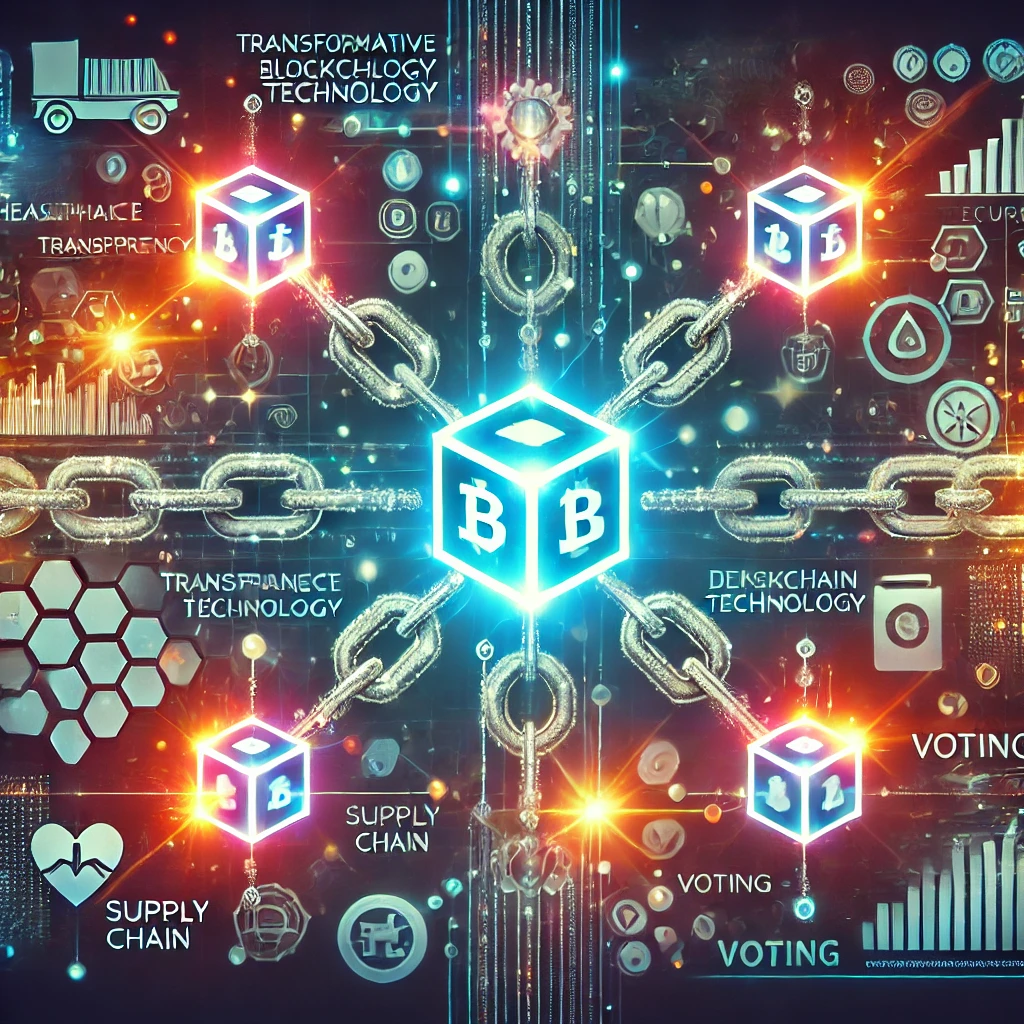Blockchain technology has become synonymous with cryptocurrencies like Bitcoin, but its potential goes far beyond digital currencies. This revolutionary technology offers a decentralized, transparent, and secure way to manage information, making it applicable to a wide range of industries. From finance and healthcare to supply chain management and voting systems, blockchain holds the power to reshape the world by enhancing efficiency, reducing costs, and ensuring data integrity.
This article explores the fundamentals of blockchain technology, its applications across different sectors, and why it is considered transformative. By understanding how blockchain works and its potential uses, you’ll gain insights into how this technology could define the future of our digital world.
What Is Blockchain?
At its core, blockchain is a decentralized digital ledger that records transactions across a network of computers. Unlike traditional systems that rely on central authorities to manage data, blockchain distributes control among multiple participants, known as nodes. This decentralized nature makes blockchain highly secure, transparent, and resistant to tampering.
How Blockchain Works
- Decentralization: Transactions are verified by a network of nodes rather than a central authority, ensuring that no single entity has control.
- Immutability: Once a transaction is added to the blockchain, it cannot be altered or deleted, providing a permanent and tamper-proof record.
- Transparency: Transactions on public blockchains are visible to all participants, fostering trust and accountability.
- Security: Cryptographic techniques safeguard the data, making it virtually impossible for unauthorized parties to alter or manipulate it.
Key Features of Blockchain
- Distributed Ledger Technology (DLT): Transactions are stored across a network of computers, eliminating the need for centralized databases.
- Smart Contracts: Automated contracts that execute when predefined conditions are met, reducing the need for intermediaries.
- Consensus Mechanisms: Methods like Proof of Work (PoW) or Proof of Stake (PoS) ensure that all nodes agree on the validity of transactions.
Applications of Blockchain Beyond Cryptocurrencies
While blockchain gained fame as the backbone of cryptocurrencies, its applications extend far beyond financial transactions. Here are some of the key industries where blockchain is making a significant impact:
1. Finance and Banking
- Decentralized Finance (DeFi): Blockchain underpins the DeFi movement, enabling financial services like lending, borrowing, and investing without intermediaries.
- Cross-Border Payments: Blockchain eliminates the need for traditional banking intermediaries, significantly reducing transaction times and fees for international payments.
- Fraud Prevention: Its immutable ledger prevents double-spending and fraudulent transactions.
2. Supply Chain and Logistics
- Traceability: Blockchain creates a transparent record of a product’s journey from origin to consumer, enhancing accountability and reducing fraud.
- Efficiency: Automating processes like inventory management and shipping documentation reduces delays and administrative overheads.
- Example: Walmart uses blockchain to track food safety, enabling rapid identification of contamination sources.
3. Healthcare
- Secure Data Sharing: Blockchain enables secure sharing of patient records among healthcare providers while protecting privacy.
- Drug Traceability: Ensures the authenticity of medicines by tracking their production and distribution.
- Fraud Reduction: Prevents tampering with medical records and insurance claims.
4. Real Estate
- Streamlined Transactions: Blockchain simplifies property transactions by digitizing contracts and eliminating intermediaries.
- Transparent Ownership Records: Provides a tamper-proof record of property ownership, reducing disputes and fraud.
5. Voting Systems
- Secure Elections: Blockchain ensures that votes are recorded accurately and transparently, reducing voter fraud.
- Increased Accessibility: Allows remote and secure voting, improving participation rates.
Why Blockchain Is a Transformative Technology
Blockchain’s ability to create trust, enhance security, and streamline operations makes it a transformative force across industries. Here’s why this technology is seen as revolutionary:
1. Transparency and Trust
Blockchain’s distributed ledger provides an open and verifiable record of transactions. This transparency builds trust among participants, particularly in industries like finance, where trust is paramount.
2. Enhanced Security
By using cryptographic techniques and decentralization, blockchain ensures that data is secure from tampering and cyberattacks. For example, in the healthcare sector, patient records stored on a blockchain cannot be altered without consensus from the network.
3. Cost Efficiency
Blockchain eliminates intermediaries, automates processes, and reduces paperwork, leading to significant cost savings. In supply chains, for example, blockchain reduces inefficiencies by automating inventory tracking and payments.
4. Empowerment through Decentralization
Blockchain democratizes data and value storage, giving individuals control over their information and assets without relying on centralized authorities. This is particularly impactful in regions with limited access to traditional financial systems.
Challenges Facing Blockchain Technology
Despite its potential, blockchain faces several hurdles that need to be addressed for widespread adoption:
1. Scalability
Blockchain networks, particularly public ones, often struggle with scalability. High transaction volumes can lead to slower processing times and increased costs.
2. Energy Consumption
Some blockchain networks, like Bitcoin, rely on energy-intensive Proof of Work mechanisms, raising environmental concerns. Efforts are being made to adopt more sustainable alternatives, like Proof of Stake.
3. Regulatory Uncertainty
Governments worldwide are still figuring out how to regulate blockchain and cryptocurrencies. This uncertainty can deter businesses and investors from fully embracing the technology.
4. Public Awareness
Many people still associate blockchain exclusively with cryptocurrencies, overlooking its broader applications. Increased education and awareness are needed to unlock its full potential.
Future of Blockchain Technology
Blockchain is poised to play a central role in the digital transformation of industries. Emerging trends like decentralized finance (DeFi), non-fungible tokens (NFTs), and blockchain-as-a-service (BaaS) are expanding its reach.
Trends to Watch
- Integration with AI: Combining blockchain with artificial intelligence could create smarter, more efficient systems for industries like healthcare and logistics.
- Green Blockchain Initiatives: Efforts to make blockchain more sustainable will drive the adoption of eco-friendly consensus mechanisms.
- Cross-Chain Solutions: Platforms that allow different blockchains to interact seamlessly will enhance the versatility of the technology.
A Visual Representation of Blockchain’s Transformative Power
This image captures the revolutionary essence of blockchain technology, showcasing its applications across industries and its potential to reshape the digital landscape.

Conclusion
Blockchain technology is more than a tool for powering cryptocurrencies—it is a revolutionary system with the potential to transform industries and redefine the way we handle data and transactions. Its decentralized nature fosters trust, enhances security, and improves efficiency, making it a valuable solution for challenges in finance, healthcare, supply chains, and beyond.
While challenges like scalability and regulatory uncertainty remain, the future of blockchain is bright. As technology evolves and awareness grows, blockchain is set to become a cornerstone of a more transparent, secure, and decentralized digital future.
By embracing blockchain, businesses, governments, and individuals can unlock new opportunities and drive innovation, shaping a world that is more connected and equitable.
Thank you for reading!
Enjoyed this article? We’ve got more content on this topic just for you. Check out our latest post in the same category and continue expanding your knowledge.
Read the next article and stay informed!






